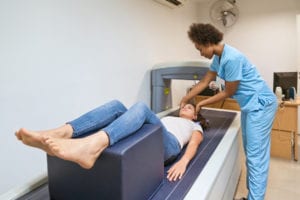
A bone density test measures the grams of calcium and other minerals that comprise your bones. The test uses X-ray technology, and a specialist may perform the scan on a forearm, hip, or part of the spine; however, DEXA scans (dual-energy X-ray absorptiometry scans) are performed on the whole body using a safe, low-absorption method to scan all of your bones in one test.
The bone density test is usually performed to help diagnose osteoporosis, which is a condition that makes your bones weaker, more brittle, and more vulnerable to fractures. Your doctor may recommend that you have this test performed due to your age or the medications you take. The scan is generally recommended for women who are age 65 or older and for men who are 70 or older.
Let’s talk about what the results may mean from your bone density test, and where you can go if you’re looking for a reputable imaging center here in The Bronx.
What Do My Bone Density Scan Results Mean?
After the scan is complete, a radiologist will interpret the results for your doctor. Radiologists are physicians who specialize in assessing scanning tests and providing a written analysis for each patient’s doctor.
You’ll receive two different scores, a T-score and a Z-score:
T-Score
This score compares your bone density to that of a healthy 30-year-old of the same gender as you. The T-score gives the standard deviation (in units) of your bone density from this standard.
If your T-score is -1 or above, that means your bone density is normal. You won’t need any intervention for osteoporosis at this point.
If you receive a T-score between -1 and -2.5, your bone density is below average. Your healthcare practitioner might prescribe a bone-enhancing medication and recommend lifestyle changes to slow down your bone loss. Your doctor will also want to monitor you in order to determine if your condition is worsening.
A T-score of -2.5 or lower may signify that you have osteoporosis. Your doctor might give you a prescription, and hormone therapy may also be recommended – especially for women, because of the natural decrease in estrogen after menopause.
Z-Score
Your Z-score is similar to the T-score, except it compares your bone density to that of the average person who is your same age and gender. This is also measured as a standard deviation.
A Z-score that is either higher or lower than normal (which is a Z-score of zero) may mean that you have a bone-loss issue that is not related to the normal aging process. If this is the case, your doctor will likely recommend further testing to determine the cause, such as a kidney or thyroid issue. Your doctor will also consider whether the prescription drugs you’re taking may be causing your bone loss.
Bone Density Testing in The Bronx, NY
Here at Starling Diagnostics, we offer DEXA bone density testing as well as MRI, ultrasound, mammograms, and CT scans. We utilize the latest imaging technology and techniques, and our staff will address all of your questions and concerns about the diagnostic process.
Schedule a scanning appointment with Starling Diagnostics, serving The Bronx and neighboring New York areas. Call us today at (718) 319-1610 or fill out our appointment request form online now. We look forward to serving you.
